
 Pope Francis visits recovering
Pope Francis visits recovering
drug addicts in Rio hospital
By FRANCIS X ROCCA

July 25, 2013
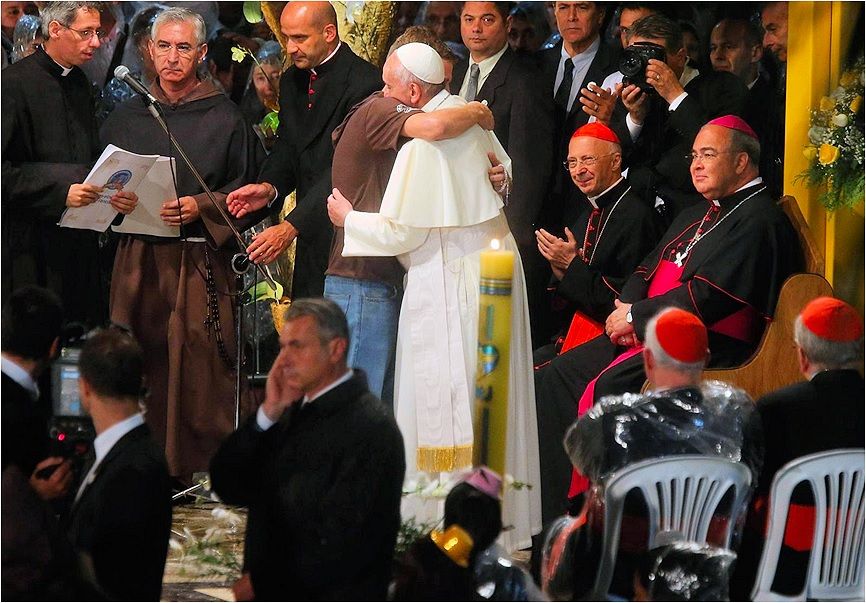
Pope Francis addressed a group of recovering drug addicts at hospital in Rio de Janeiro, offering them a message of compassion and a challenge.
At the Hospital of St Francis of Assisi, which the Pope called a “shrine of human suffering,” he told patients they were the “flesh of Christ,” like the leper embraced by the institution’s patron saint in a crucial step toward his conversion. He also said those struggling with drug dependency deserve the “closeness, affection and love” of all society.
Yet he also stressed the necessity of personal will in recovering from addiction. “To embrace someone is not enough,” Pope Francis said. “We must hold the hand of the one in need, of the one who has fallen into the darkness of dependency perhaps without even knowing how, and we must say to him or her: ‘You can get up, you can stand up. It is difficult, but it is possible if you want to.’
“Dear friends, I wish to say to each of you, but especially to all those others who have not had the courage to embark on our journey: ‘You have to want to stand up; this is the indispensable condition.’”
The Pope arrived at the hospital on Wednesday afternoon and was greeted by patients, family members and hospital staff packed into one of the hospital’s courtyards. The audience was in good spirits despite the rain, and Pope Francis spent nearly an hour passing through the crowd. He then listened to several speeches, including two by recovering addicts.
The Pope’s speech, delivered in Portuguese, also addressed the social, political and economic ramifications of drug abuse. He denounced the “scourge of drug-trafficking that favurs violence and sows the seeds of suffering and death,” and called traffickers “dealers of death,” who “follow the logic of money and power at any cost.”
He said that the answer to drug addiction was not a “liberalisation of drug use, as is currently being proposed in various parts of Latin America,” but solutions to the “problems underlying the use of these drugs.”
Such solutions, Pope Francis said, include “promoting greater justice, educating young people in the values that build up life in society, accompanying those in difficulty and giving them hope for the future.”
During his visit, Pope Francis inaugurated a new wing of the hospital dedicated to treating users of crack cocaine, who represent three percent of the population of Brazil, according to the World Health Organisation statistics cited by the hospital. The city of Rio estimates there are 6,000 crack users in the city alone.
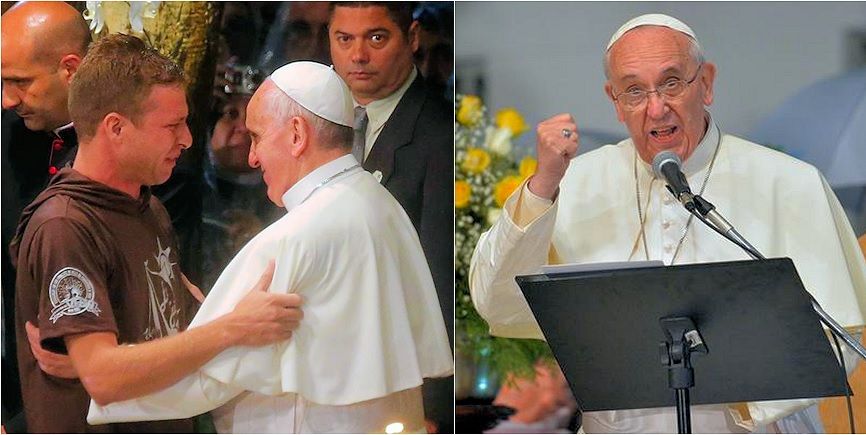
Here is the official Vatican translation of the Pope's remarks:
Dear Archbishop Tempesta, brother Bishops,
Distinguished Authorities,
Members of the Venerable Third Order of Saint Francis of Penance,
Doctors, Nurses, and Health Care Workers,
Dear Young People and Family Members,
God has willed that my journey, after the Shrine of Our Lady of Aparecida, should take me to a particular shrine of human suffering – the Saint Francis of Assisi Hospital.
The conversion of your patron saint is well known: the young Francis abandoned the riches and comfort of the world in order to become a poor man among the poor. He understood that true joy and riches do not come from the idols of this world – material things and the possession of them – but are to be found only in following Christ and serving others.
Less well known, perhaps, is the moment when this understanding took concrete form in his own life. It was when Francis embraced a leper. This brother, suffering and an outcast, was the “mediator of light ... for Saint Francis of Assisi” (Lumen Fidei, 57), because in every suffering brother and sister that we embrace, we embrace the suffering Body of Christ.
Today, in this place where people struggle with drug addiction, I wish to embrace each and every one of you, who are the flesh of Christ, and to ask God to renew your journey, and also mine, with purpose and steadfast hope.
To embrace – we all have to learn to embrace the one in need, as Saint Francis did. There are so many situations in Brazil, and throughout the world, that require attention, care and love, like the fight against chemical dependency.
Often, instead, it is selfishness that prevails in our society. How many “dealers of death” there are that follow the logic of power and money at any cost! The scourge of drug-trafficking, that favours violence and sows the seeds of suffering and death, requires of society as a whole an act of courage.
A reduction in the spread and influence of drug addiction will not be achieved by a liberalization of drug use, as is currently being proposed in various parts of Latin America. Rather, it is necessary to confront the problems underlying the use of these drugs, by promoting greater justice, educating young people in the values that build up life in society, accompanying those in difficulty and giving them hope for the future.
We all need to look upon one another with the loving eyes of Christ, and to learn to embrace those in need, in order to show our closeness, affection and love.
To embrace someone is not enough, however. We must hold the hand of the one in need, of the one who has fallen into the darkness of dependency perhaps without even knowing how, and we must say to him or her: You can get up, you can stand up. It is difficult, but it is possible if you want to.
Dear friends, I wish to say to each of you, but especially to all those others who have not had the courage to embark on our journey: You have to want to stand up; this is the indispensible condition! You will find an outstretched hand ready to help you, but no one is able to stand up in your place.
But you are never alone! The Church and so many people are close to you. Look ahead with confidence. Yours is a long and difficult journey, but look ahead, there is “a sure future, set against a different horizon with regard to the illusory enticements of the idols of this world, yet granting new momentum and strength to our daily lives” (Lumen Fidei, 57).
To all of you, I repeat: Do not let yourselves be robbed of hope! And not only that, but I say to us all: let us not rob others of hope, let us become bearers of hope!
In the Gospel, we read the parable of the Good Samaritan, that speaks of a man assaulted by robbers and left half dead at the side of the road. People pass by him and look at him. But they do not stop, they just continue on their journey, indifferent to him: it is none of their business! Only a Samaritan, a stranger, sees him, stops, lifts him up, takes him by the hand, and cares for him (cf. Lk 10:29-35).
Dear friends, I believe that here, in this hospital, the parable of the Good Samaritan is made tangible. Here there is no indifference, but concern. There is no apathy, but love.
The Saint Francis Association and the Network for the Treatment of Drug Addiction show how to reach out to those in difficulty because in them we see the face of Christ, because in these persons, the flesh of Christ suffers.
Thanks are due to all the medical professionals and their associates who work here. Your service is precious; undertake it always with love. It is a service given to Christ present in our brothers and sisters. As Jesus says to us: “As you did it to one of the least of these my brethren, you did it to me” (Mt 25:40).
And I wish to repeat to all of you who struggle against drug addiction, and to those family members who share in your difficulties: the Church is not distant from your troubles, but accompanies you with affection.
The Lord is near you and he takes you by the hand. Look to him in your most difficult moments and he will give you consolation and hope. And trust in the maternal love of his Mother Mary.
This morning, in the Shrine of Aparecida, I entrusted each of you to her heart. Where there is a cross to carry, she, our Mother, is always there with us. I leave you in her hands, while with great affection I bless all of you.

 As it happens, there was a similar event during Benedict XVI's apostolic visit to Brazil in May 2007, on a larger scale. I've chosen to re-post John Allen's account because he admirably places the event in the context of Benedict's consistent message during the trip...
Benedict issues dramatic warning
As it happens, there was a similar event during Benedict XVI's apostolic visit to Brazil in May 2007, on a larger scale. I've chosen to re-post John Allen's account because he admirably places the event in the context of Benedict's consistent message during the trip...
Benedict issues dramatic warning
to drug dealers,
but his real message is Christ
By JOHN L. ALLEN JR.
Guaratinguetá, Brazil
Posted on May 12, 2007
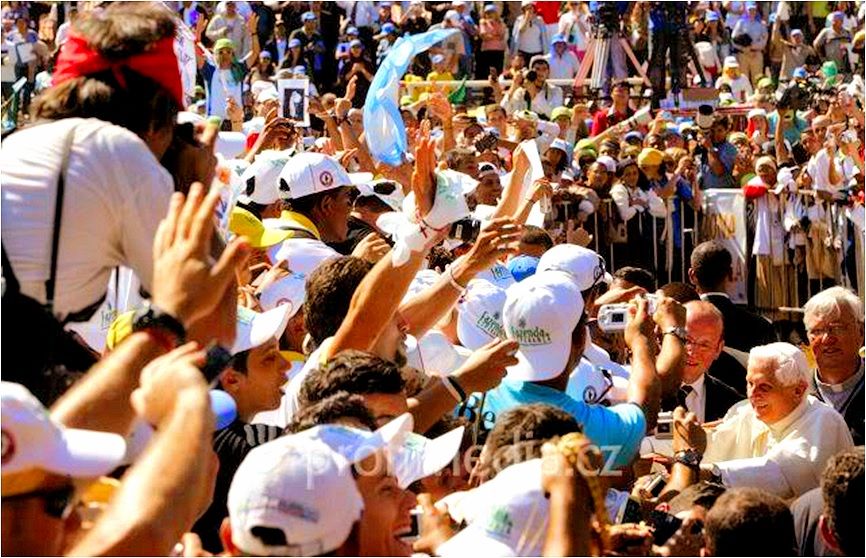
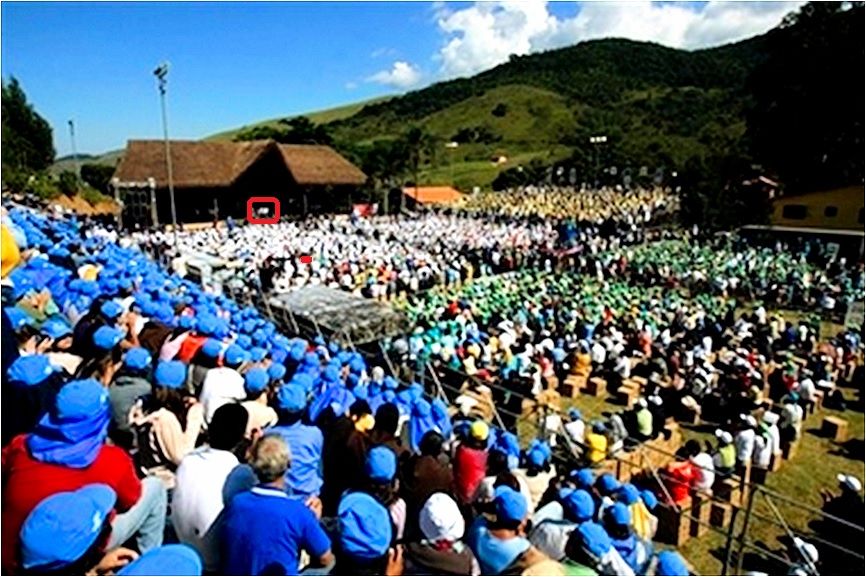
Day four of Pope Benedict XVI’s trip to Brazil was designed to be the one when the pope immersed himself in the social trauma of Latin America, visiting a rural center for young victims of alcohol and drug addiction, many of whom were driven into dependency as a result of poverty and hopelessness.
The pope delivered on those expectations, issuing a rare papal threat – this time, to drug pushers. He called the drug traffic “evil” and warned that, “God will demand an accounting of what they’ve done. Human dignity cannot be trampled upon like this.”
Yet even in this setting, the pope did not pull back from what has been the heart of his Brazilian message: If the spiritual fundamentals are missing, no program of attending to material and social needs – however worthy in itself, such as the fight against drugs – can offer an ultimate solution to human suffering. That solution, he insisted, stems from only one source, Jesus Christ.
In that sense, Benedict XVI’s Brazil trip has had a decidedly Christological emphasis.
His message on drugs resonates in today’s Latin America. Once considered a scourge of far-off, First World countries, drug addiction has reached epidemic proportions here over the last two decades.
In Brazil, World Health Organization estimates are that the cost of health care related to drug abuse in the 1990s soared from $900 million to almost $3 billion, and the percentage of AIDS cases caused by intravenous drug use rose from 2.5 percent to 25 percent.
The pope’s comments on the drug scourge came at Fazenda Speranda, or “Farm of Hope,” a recovery center founded by a German priest named Fr. Hans Stempel. It draws on the spirituality of the Franciscans and the Focolare movement.
To reach the spot, Benedict traveled by car roughly an hour into the Brazilian countryside from Aparacida, to a bucolic agricultural setting distinguished by rolling hills, a small river, and the occasional cow mooing at passer-bys.
The beauty of the setting, and the obvious enthusiasm of the crowd of roughly 6,000, most of them young people from the Fazenda Speranza, did not distract the pope from his Christological focus.
In a brief session with Poor Clare Sisters who work at the Farm of Hope, Benedict said their efforts offer “a clear witness to the Gospel of Christ amid a consumer society far removed from God,” and complimented them for attempting to “vanquish the prisons and break the chains of drugs that bring so much suffering to God’s beloved children.”
“We need to build up hope, weaving the fabric of a society that, by relaxing its grip on the threads of life, is losing the true sense of hope,” the pope said.
At the center itself, Benedict stressed that most important work done by the Farm of Hope is not physical and psychological recovery, valuable as that is, as but spiritual conversion – “returning to God, and to participation in the life of the church.”
“It’s not enough to cure the body,” Benedict said. “One has to adorn the soul with the most precious divine gifts acquired in baptism.”
Citing Jesus’s promise in the Gospel of John that whoever follows him “will have the light of life,” Benedict said that his mission is to “renew in people’s hearts this light that never goes out, so that it will shine in the most intimate corners of the souls of all those who seek true goodness and peace, which the world cannot give.”
“God does not compel, does not oppress individual liberty,” the pope said. “He only asks the openness of that sacred place of our conscience, though which all the noblest aspirations pass, but also the disordered feelings and passions that obscure the message of the Most High.”
Benedict told the Poor Clares that, “It is the risen Christ who heals the wounds and saves the sons and daughters of God, saves humanity from death, from sin and from slavery to passions.”
The bottom line for Benedict XVI in Brazil thus seems to be this: If you want to give life to the suffering peoples of Latin America, give them Christ.
Downplaying the specifically “religious” dimension of the church’s message not only betrays its mission, he believes, but in the end it fails to produce the desired social results.
“It is God alone whose essence is love, and whose glory is man fully alive,” Benedict said.
Stempel, the founder of Fazenda Speranda, is from the Paderborn diocese in Germany. He arrived in Brazil in 1972, and later became a Franciscan. Serving as a parish priest in the rural community of Guarantinguetá, he decided to find a social center, initially for victims of alcohol and drug abuse, and later expanding to serve other vulnerable populations, including young unwed mothers and poor families.
Stempel was the architect of Benedict’s visit to Fazenda Speranza. In January 2006, he traveled to Rome to meet with Benedict, and delivered letters from 80 bishops asking that the pope add a stop here, and in December 2006 he received confirmation that the pope would come. Today, he was the host and emcee of the event with the pope.
Paderborn is one of the wealthiest dioceses in Germany, which funds many projects in Brazil, including the Fazenda Speranza. A large banner above the entrance the day of the pope’s arrival captured the German influence, wishing Benedict Herzlich Willkommen, Heilige Vater!, or “Hearty Greetings, Holy Father!”
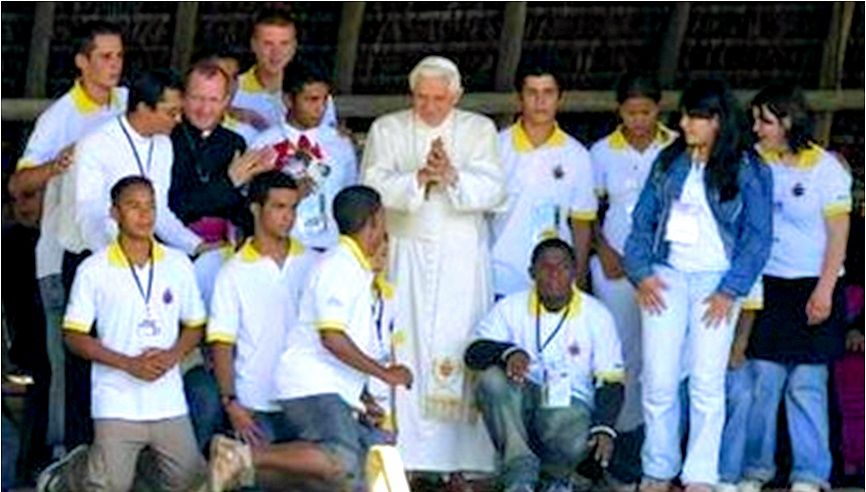
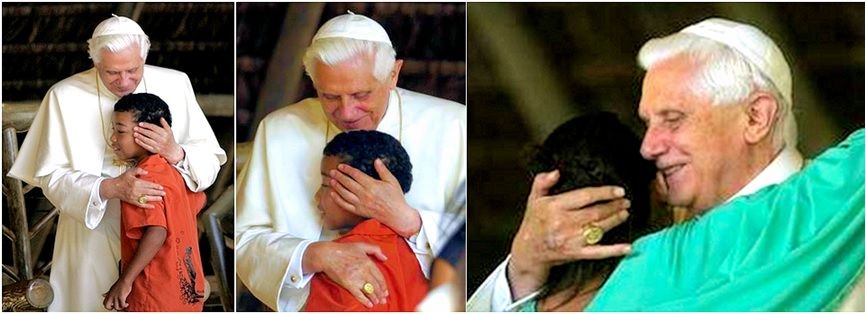
Prior to the pope’s remarks, five young people told the pope their stories of recovery from drug addiction, anorexia, and other maladies. Several choked back tears as they spoke. Adding an ecumenical note, one of the youths was Lutheran and another Orthodox. After each spoke, the pope wrapped him or her in an embrace.
At the end of the roughly hour-long event, it was announced that Benedict XVI had donated $100,000 to the Fazenda Speranza. Added to the $200,000 that Benedict earlier donated for churches in the Amazon, that brings the total for papal generosity in Brazil to $300.000.
[NB:These are his personal donations, from the royalties earned by his writings, which fund charitable causes, as well as the research and theological scholarships carried out by the foundations set up in his name.
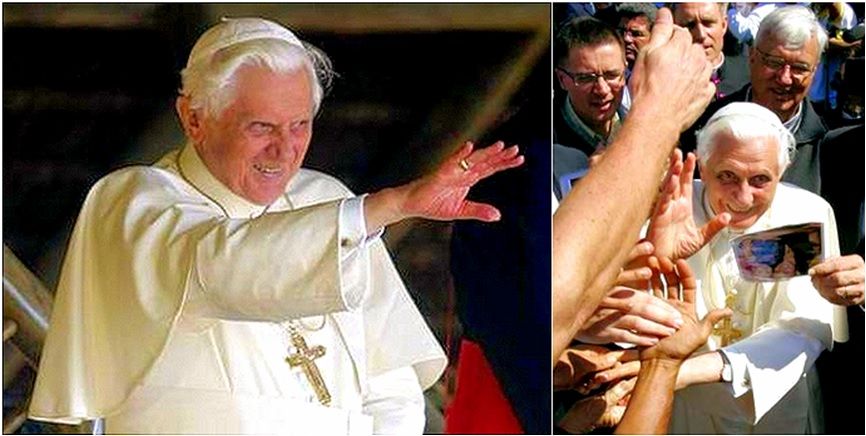 It would be a grave oversight not to re-post the addresses given by Benedict XVI at the Facenda da Esperanca. Those of us who watched the CTV coverage of the Brazil events are not likely to forget the immense spiritual and emotional power of each encounter that the Holy Father had. As with everything he writes, every re=reading is a new spiritual experience that is also an adventure in ideas. Here are the Vatican translations of his words to the community, and rhe remarks he made in private earlier to the Poor Clares who help run the facility. The addresses were delivered in Portuguese.
It would be a grave oversight not to re-post the addresses given by Benedict XVI at the Facenda da Esperanca. Those of us who watched the CTV coverage of the Brazil events are not likely to forget the immense spiritual and emotional power of each encounter that the Holy Father had. As with everything he writes, every re=reading is a new spiritual experience that is also an adventure in ideas. Here are the Vatican translations of his words to the community, and rhe remarks he made in private earlier to the Poor Clares who help run the facility. The addresses were delivered in Portuguese.
[How strange, by the way, that he says almost more about Francis of Assisi here than Pope Francis did yesterday at the Franciscan hospital for drug rehabilitation! In fact, Benedict XVI may have said more about Francis of Assisi during the eight years of his Pontificate than everything Pope Francis has ever said about his namesake before he became Pope and since, and perhaps more than any Pope in living memory. A compilation of Benedict XVI's dicourses and citation of Francis could be a very edifying book...I digress, but another point I have been dying to make these days is how Joseph Ratzinger/Benedict XVI has never called attention to his devotion to Mary - yet he grew up venerating her on frequent childhood pilgrimages to Altoetting with his family; he wrote three books about Mary when he was cardinal; and he offered the papal Golden Rose to each of the Marian shrines he visited in Italy (even the little-known rural ones) and in other countries. And yet, the prevailing media meme is that his oredecessor and his successor are both passionate Marian devotees in a way that puts him outside their league (as in every other category if the media could simply have their untramelled way!]... Anyway, back to the Facenda Esperanza...
Address to the Community
Dear Friends!
At last I am here with you at "Fazenda da Esperança"!
I greet with particular affection Brother Hans Stapel, founder of the charity "Nossa Senhora da Glória", which is also known as "Fazenda da Esperança ". Firstly I wish to rejoice with each of you for having believed in the ideals of good and of peace which define this place.
To all of you who have come here today from the various "fazendas" to be with the Pope - those undergoing treatment and those who have been cured, volunteers, families, those who have already been through the programme, and benefactors -- I wish to say: "pax et bonum!"
I know that there are representatives here from other places where the "Fazenda da Esperança " has opened centres. You have come to see the Pope. You have come to listen and to assimilate what I wish to say to you.
The Church of today needs a renewed awareness of its task to draw the world's attention to the voice of him who says: "I am the light of the world; he who follows me will not walk in darkness, but will have the light of life" (John 8:12).
It is the Pope's mission to renew in the hearts of people everywhere that light which does not grow dim, because it seeks to illumine the depths of every soul that seeks the true good and peace that the world cannot give.
All that this light needs is a heart open to the desire for God. God does not force us, he does not oppress our individual freedom; he simply asks for openness in the inner sanctum of our conscience, through which pass all our noblest aspirations, as well as the affections and disordered passions which tend to obscure the message of the Almighty.
"Behold, I stand at the door and knock; if anyone hears my voice and opens the door, I will come in to him and eat with him, and he with me" (Revelation 3:20). These are divine words which penetrate to the depths of our souls and shake us at our deepest roots.
At some stage in people's lives, Jesus comes and gently knocks at the hearts of those properly disposed. Perhaps for you, he did this through a friend or a priest, or, who knows, perhaps he arranged a series of coincidences which enabled you to realize that you are loved by God.
Through the institution which has welcomed you, the Lord has given you this opportunity for physical and spiritual recovery, so vital for you and your families. In turn, society expects you to spread this precious gift of health among your friends and all the members of the community.
You must be Ambassadors of hope! Brazil's statistics concerning drug abuse and other forms of chemical dependency are very high. The same is true of Latin America in general.
I therefore urge the drug-dealers to reflect on the grave harm they are inflicting on countless young people and on adults from every level of society: God will call you to account for your deeds. Human dignity cannot be trampled upon in this way. The harm done will receive the same censure that Jesus reserved for those who gave scandal to the "little ones", the favourites of God (cf. Matthew 18:7-10).
Through treatment, which includes medical, psychological and educational assistance, and through much prayer, manual work and discipline, many people - especially young people - have already succeeded in freeing themselves from alcohol and drug dependency, thereby recovering meaning in their lives.
I wish to express my appreciation for this work, which has the charism of Saint Francis and the spirituality of the Focolare Movement as its spiritual foundation.
Reintegration in society undoubtedly demonstrates the effectiveness of your initiative. Yet it is the conversions, the rediscovery of God and active participation in the life of the Church which attract even greater attention and which confirm the importance of your work. It is not enough to care for the body, we must adorn the soul with the most precious divine gifts acquired through Baptism.
Let us thank God for all those who have set out along the path of renewed hope, with the help of the Sacrament of Reconciliation and the celebration of the Eucharist.
Dear friends, I cannot let this opportunity pass without thanking all those who contribute materially and spiritually to enable the charity "Nossa Senhora da Glória" to continue its work.
May God bless Brother Hans Stapel and Nelson Giovanelli Ros for having answered his call to devote their lives to you. I ask the Lord also to bless all those who work here: the consecrated men and women, and the volunteers. We ask God's special blessing too on all those friends, support groups and authorities who supply your needs, and on all those who love Christ present in these beloved children of his.
My thoughts turn now to those many other institutions throughout the world which work to rebuild and renew the lives of these brothers and sisters of ours present in our midst, whom God loves with a preferential love.
I am thinking of groups such as Alcoholics Anonymous and Narcotics Anonymous as well as the sobriety associations working generously in many communities so as to build up the lives of others.
The proximity of the Shrine of Aparecida assures us that the "Fazenda da Esperança" came into being under her protection and maternal gaze.
For a long time now, in my prayers, I have been asking Our Lady, Queen and Patron of Brazil, to extend her protective mantle over the participants in the Fifth General Conference of the Bishops of Latin America and the Caribbean.
Your presence here provides a considerable help for the success of this great gathering; offer your prayers, sacrifices, and renunciations on the altar of the Chapel, in the certainty that they will rise up to heaven in the Holy Sacrifice of the Mass as a fragrant offering to Almighty God. I am counting on your help!
May Saint Frei Galvão and Saint Crescentia keep watch over you and protect each one of you. I bless you all in the name of the Father and of the Son and of the Holy Spirit. Amen.
And here is the Vatican translation of the Pope's address earlier to the Poor Clares at the Facenda:
ADDRESS TO THE POOR CLARES
Be praised, my Lord, for all your creatures!
With these words, addressed to the Almighty and Good Lord, the Poor Saint of Assisi acknowledged the unique bounty of God the Creator, and the tenderness, strength and beauty that gently flows out upon all his creatures, making them mirrors of the Creator's omnipotence.
Dear Sisters, spiritual daughters of Saint Clare, our gathering here in this "Fazenda da Esperança " is meant to be a sign of the affection of the Successor of Peter towards the cloistered Sisters, and also a serene manifestation of love, echoing through the hills and valleys of the Mantiqueira mountain-range and spreading throughout the whole land: "No speech, no word, no voice is heard; yet their span extends through all the earth, their words to the utmost bounds of the world" (Psalm 18:4-5).
From this place, the daughters of Saint Clare proclaim: "Be praised, my Lord, for all your creatures!"
In places where society no longer sees any future or hope, Christians are called to proclaim the power of the Resurrection: it is here, in this "Fazenda da Esperança " - home to so many, especially young people, who are seeking to overcome drug addiction, alcoholism, and chemical dependency - that a clear witness is given to the Gospel of Christ amid a consumer society far removed from God.
What a contrast from the prospect of the Creator beholding his work! In their contemplative lives, the Poor Clare Sisters and other cloistered religious gaze upon the greatness of God and also discover the beauty of his creation; hence they can picture him as the sacred author indicates, caught up in wonder at his handiwork, his beloved creation: "And God saw everything that he had made, and behold, it was very good!" (Genesis 1:31).
When sin entered the world, and with sin, death, God's beloved creation, though wounded, was not totally deprived of beauty: on the contrary, a still greater love was received: "O happy fault, which gained for us so great a Redeemer!" - as the Church proclaims in the Exsultet during the mysterious and radiant night of Easter.
It is the risen Christ who heals the wounds and saves the sons and daughters of God, saves humanity from death, from sin and from slavery to passions. The Passover of Christ unites heaven and earth.
In this Fazenda da Esperança, the prayers of the Poor Clare Sisters are united with the demanding work of medicine and therapy in order to vanquish the prisons and break the chains of drugs that bring so much suffering to God's beloved children.
In this way God's creation is restored to the beauty that so delights and amazes its Creator. He is the Almighty Father, it is he alone whose essence is love and whose glory is man fully alive, in the expression of Saint Irenaeus.
He "so loved the world that he gave his only Son" (John 3:16), in order to raise up the one who had fallen along the roadside, attacked and wounded by thieves on the way from Jerusalem to Jericho.
On the pathways of the world, Jesus is "the hand" that the Father stretches out to sinners; he is the way that leads to peace (cf. Second Eucharistic Prayer for Reconciliation). Truly we discover here that the beauty of creation and the love of God are inseparable.
Francis and Clare of Assisi also discover this secret and they propose to their beloved sons and daughters one very simple thing: to live the Gospel. This is their norm of conduct and their rule of life. Clare expressed it very well when she said to her sisters: "Among yourselves, my daughters, let there be the same love with which Christ has loved you" (Testament).
In this same love, Brother Hans invited them to be the guarantors of all the work carried out in the Fazenda da Esperança. Through the strength of silent prayer, through fasting and penance, the daughters of Saint Clare live out the commandment of love for God and neighbour in its supreme form, loving to the end.
This means that we must never lose hope! Hence the name given to this work by Brother Hans: Fazenda da Esperança. We need to build up hope, weaving the fabric of a society that, by relaxing its grip on the threads of life, is losing the true sense of hope. This loss, according to Saint Paul, is the self-imposed curse of "heartless persons" (cf. Romans 1:31).
My dear Sisters, make it your task to proclaim that "hope does not disappoint" (Romans 5:5). May the sorrow of the Crucified Lord, which filled Mary's soul at the foot of the Cross, console the hearts of many mothers and fathers who weep with sorrow because of their children's continuing dependency on drugs.
By your silent prayerful self-offering, an eloquent silence that the Father hears, proclaim the message of love that conquers sorrow, drugs and death. Proclaim Jesus Christ, a human being like us, who suffers like ourselves, who took our sins upon himself in order to deliver us from them!
Soon we shall begin the Fifth General Conference of the Episcopate of Latin America and the Caribbean at the Shrine of Aparecida, so close to the Fazenda da Esperança. I trust in your prayers, that our peoples may have life in Jesus Christ and that we may all be his disciples and missionaries.
I implore Mary, the Mother Aparecida, the Virgin of Nazareth who, in following Christ, kept all these things in her heart, to keep you in the fruitful silence of prayer.
To all cloistered Sisters, especially to the Poor Clares present in this institution, I impart my blessing with great affection.
 Sorry about the 'unrepresentative' photos from Guaratingueta. I was using Image Shack at the time, and somehow half of the photos I posted online through them have vanished into cyberspace. During the Cologne WYD, I was very much the online neophyte, that I did not even think to archive the photos - all I did was to print out every photo I could find (and all I had was a B&W printer), and so I have a pretty thick album of B&Ws on Cologne but nothing immediately Forum-usable. It would have been very opportune now to repost all that is available of WYD Cologne, but not 'working' at the time for any Forum, but simply contributing my bit to commentary celebrating Joseph Ratzinger/Benedict XVI, I do not have any ready material to pick and lift...
Sorry about the 'unrepresentative' photos from Guaratingueta. I was using Image Shack at the time, and somehow half of the photos I posted online through them have vanished into cyberspace. During the Cologne WYD, I was very much the online neophyte, that I did not even think to archive the photos - all I did was to print out every photo I could find (and all I had was a B&W printer), and so I have a pretty thick album of B&Ws on Cologne but nothing immediately Forum-usable. It would have been very opportune now to repost all that is available of WYD Cologne, but not 'working' at the time for any Forum, but simply contributing my bit to commentary celebrating Joseph Ratzinger/Benedict XVI, I do not have any ready material to pick and lift...[Modificato da TERESA BENEDETTA 26/07/2013 03:25]